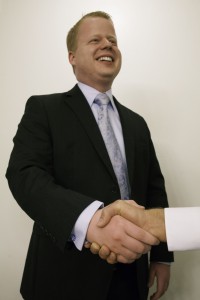With the current job market, it is becoming increasingly difficult for recent graduates to land a job, especially with the competitive nature of interviews.
There are many things, however, interviewees can do to practice and prepare for interviews, increasing their chances of making a good impression with employers and ultimately landing a worthwhile job.
Doing research before an interview is one of the best things candidates can do to prepare. Researching the company, the industry, the position, the type of interview or the general process of the interview will help the candidate come across as competent and informed.
Lisa Christensen, a career counselor at University Career Services, said preparing for an interview can help to ease nerves, and she recommends preparing for a specific type of interview.

She said there are generally two types of interviews: case and behavioral. Case interviews are often seen in consulting, investment banking and business industries and are designed to test applicants’ thinking and reasoning skills to determine how they solve problems. In behavioral interviews, employers ask questions to determine how job-seekers have behaved in the past and thereby learn how they might behave in the future.
Christensen said it is important that applicants know how to tell their stories during the interview.
“Preparing ahead to share certain things is vital,” she said. “I’m not a proponent of memorizing, just practicing and preparing ahead of time to know how to tell your stories.”
One method Christensen suggests students use is “CAR:” Circumstance, Action and Result. To do this, interviewees would describe the background or circumstance they faced, the actions they took and the results of those actions.
“This doesn’t necessarily mean that it was always a positive result,” she said. “Sometimes, you’re sharing experiences that had a negative outcome, but you learned a significant lesson and didn’t repeat it.”
Richard Ang, another career counselor at University Career Services, said everyone has strengths and weaknesses, and employers will ask about them.
“When asking about strengths, employers are asking about the skills and competencies you would be bringing into their company,” Ang said. “They do not want a standard answer; they want to know how your strengths can provide what the company needs.”
Ang said employers do not want to hear that their applicants do not have any weaknesses. He said everyone has weaknesses, but the problem comes when applicants state their weaknesses and do not offer solutions of what they are doing to improve.
Candidates only have one chance to make a good impression, he said. They should dress appropriately for the interview, have good eye contact and use a title when addressing the interviewer.
“When you walk into an interview room, smile and shake hands with the recruiter,” Ang said. “In that moment, a recruiter can tell who you are.”
Ryan Krueger, a business management student from Highland, said applicants should do anything that will give them an edge in an interview, including confirming interview dates and times, being punctual, preparing for the interview, adhering to the company’s dress code and following up.
Krueger said the worst thing candidates can do is act presumptuous and expect to be handed things they do not work for.
“You have to put in the time, and you have to be willing to sacrifice,” Krueger said. “If employers don’t see that in an interview, and if they don’t see your humility and your willingness to work, then it’s a big turn-off. The job interview isn’t just for the company to see you as a good match, but also for you to see the company as a good match.”
What to wear to an interview
Men:
- Single-breasted navy, black or charcoal gray two-piece suit
- White, long-sleeved, collared shirt
- Conservative tie
- Belt and shoes of matching color
- Minimal cologne
- Clean, neat haircut
- Bring a briefcase or portfolio instead of a backpack
Women:
- Skirted suit with conservative skirt length and neutral in color (black, gray or navy)
- White or light colored blouse with conservative neckline
- Closed-toe dark shoes with low to medium heel
- Minimal perfume and makeup
- Moderate amount of jewelry
- Neat hairstyle pulled back from face
- Bring a briefcase or portfolio instead of a backpack or purse
More interviewing tips can be found on the University Career Services website: www.ucs.byu.edu




